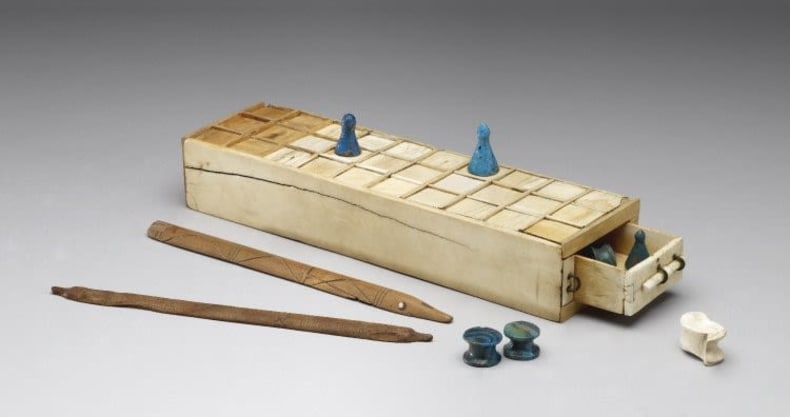Board games have always been more than just a way to pass the time. In ancient Arab cultures, these games were a mix of entertainment, social connection, and even spiritual significance.
Over the centuries, many of these games evolved from sacred rituals to popular pastimes. Let’s take a look at some of the iconic ancient games and explore how they’ve shaped our view of strategy, chance, and culture.
1. Senet: The Egyptian Game of the Afterlife
Senet holds the title as one of the oldest known board games. Its origins date back to around 3100 BCE in ancient Egypt. People played it on a grid of 30 squares, and the goal was to move pieces across the board using dice-like throws, similar to the modern-day backgammon.
But Senet wasn’t just about winning—it was deeply symbolic, representing the journey through the afterlife. As players moved their pieces, they believed they were navigating the trials of the underworld.
2. The Royal Game of Ur: The Mesopotamian Classic of Strategy and Luxury
Crossing the desert into Mesopotamia, we find the Royal Game of Ur, which dates back to 2600 BCE. Known for its luxurious boards and intricate pieces, this game quickly became a favorite among Sumerian royalty.
You play the game on a rectangular board with 14 pieces. Once the game begins, players use dice to advance, aiming to move all their pieces off the board. The game’s appeal was in its mix of strategy and chance, with its designs adding flair to the gameplay.
3. Mehen: The Egyptian Spiral Game of Rebirth
Another fascinating ancient Egyptian game is Mehen, dating back to around 3000 BCE. Unlike Senet, people played Mehen on a spiral-shaped board that resembled a coiled snake.
Players moved their pieces along the serpent’s body, which symbolized a journey of rebirth or even the sun god’s eternal travels across the sky. With its unique board and gameplay, Mehen stands as one of Egypt’s most mysterious games, since its exact rules are lost to time.
4. The Game of Twenty Squares: The Persian Racing Game
The Game of Twenty Squares is a race game, originating in the Middle East and played from the 2nd millennium B.C. It was most popular in ancient Egypt, although its spread extended to places like Cyprus, Mesopotamia, and even India. The game board consists of 20 squares, arranged in three rows of four, with an eight-square extension in the middle row.
Two players compete to move their pieces from one end of the board to the other, following a specific path that includes both regular and marked squares. The game shares many similarities with the Royal Game of Ur, with the goal of reaching the end of the board while navigating obstacles, including opponents’ pieces.
5. Hounds and Jackals: The Egyptian Racing Game
Dating back to 1800 BCE, Hounds and Jackals was a racing game with 58 holes on the board, where players moved pieces shaped like animals. While it was enjoyed for fun, the game likely held deeper meaning, reflecting life’s unpredictable journey and perhaps symbolizing the transition to the afterlife.
As it gained popularity in ancient Egypt, it spread across the region, becoming a familiar pastime in the Levant and Mesopotamia, with each culture adding its own unique twist.
6. Tâb: The Middle Eastern Game of War Strategy
Tâb, which emerged around 1310, is a game deeply embedded in the Islamic world. Played on a four-row board with nine squares, the game centers around strategy, with players moving pieces to capture their opponents.
What makes Tâb unique is its focus on military tactics—players had to think ahead and anticipate their opponent’s moves, similar to the art of war. Initially popular among the lower classes in Egypt, Tâb became a symbol of social interaction.
The Evolution: From Sacred Rites to Popular Pastimes
These games evolved from sacred rituals to popular leisure activities, with Senet and Mehen tied to spirituality, while Tâb and the Game of Twenty Squares became everyday pastimes.
Today, they continue to inspire modern board games and digital entertainment, reminding us that even in ancient times, people enjoyed connecting and reflecting on life’s challenges through simple games and meaningful symbolism!
WE ALSO SAID: Don’t Miss…5 Great Puzzle Games To Play With Your Kids



